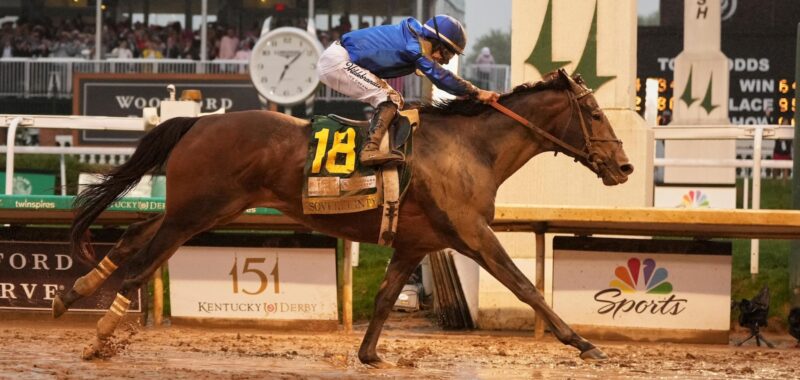Just a few days after winning the Kentucky Derby, Sovereignty was ruled out of running in the Preakness Stakes.
It is the second time in four years the owner and trainer of the Derby champion opted to skip the Preakness in favor of the Belmont Stakes in June. Rich Strike also bypassed the Preakness in 2022 after winning at Churchill Downs at odds of 80-1.
Country House did not run in 2019 because of illness after getting elevated to Derby winner when Maximum Security was disqualified for interference, the races were run out of order in 2020 and Medina Spirit ran and finished third in the 2021 Preakness after being DQed from his first-place finish in the Derby for a positive drug test.
That means this is the fifth time in seven years that the Preakness gates open at Pimlico Race Course in Baltimore without even a chance at a Triple Crown. That was only the case once in the previous 33 years from to 1986-2018, and that happened because a horse was retired because of injury after taking the Run for the Roses.
Horse racing has changed from its heyday, when stars of the sport like War Admiral, Secretariat and Seattle Slew were used to running every couple of weeks. Breeding, money and other factors have changed that, and the top 3-year-old horses eligible for the Triple Crown race far less often, with bigger stretches in between.
“Most trainers hate running their horses back in two weeks,” NBC Sports analyst Randy Moss said. “They feel like it’s bad for the horses.”
Beginning in the early 21st century, many of the Derby horses who finish between second and 20th started getting more rest to wait five weeks for the Belmont. It was essentially automatic that the Derby winner would go, though not anymore.
“The trainers of Derby winners that do run back in the Preakness do it out of a sense of tradition — not because they like it,” Moss said.
Sovereignty’s Bill Mott made that clear the morning after his horse passed Journalism down the stretch in the mud at Churchill Downs with a record audience watching, casting doubt on the Preakness.
“We want to do what’s best for the horse,” Mott told reporters in Louisville, Kentucky, on Sunday. “Of course, you always think about a Triple Crown, and that’s not something we’re not going to think about.”
The debate has been raging for decades about horses not being able to handle the grind of three premier races over a span of five weeks. That was primarily because no one swept the Triple Crown between Affirmed in 1978 and American Pharoah in 2015, a 37-year drought that made industry stakeholders question tradition versus modern-day changes.
Justify doing it in 2018 to give the sport a pair of Triple Crown champions in four years quieted that talk. The recent uncertainty about Derby winners going to the Preakness reignited the chatter.
Prominent owner Mike Repole shared a proposal on social media Tuesday that would move the Belmont up to second in the rotation and shift the Preakness back to provide more spacing. Others have suggested moving the Preakness back to the first Saturday in June and the Belmont to the first Saturday in July.
No one really knows. And does there need to be seismic change like the pitch clock in baseball?
Maybe, maybe not. After all, the previous two Derby winners — Mystik Dan last year and Mage in 2023 — wheeled back after two weeks to finish in the money at the Preakness.
They didn’t win, but their trainers wanted to give it a shot. And Bob Baffert-trained American Pharoah and Justify completing the Triple Crown showed it was possible.
“We’ll see Triple Crown winners because there will occasionally be horses like American Pharoah and like Justify who are good enough to blow up any of the current thoughts about spacing,” Moss said.
And trainers who aren’t worried about it. Baffert and 89-year-old fellow Hall of Famer D. Wayne Lukas have shown a willingness to go for it after winning the Derby — and even when they don’t. Lukas intends to run American Promise in the Preakness after a 16th place finish in Kentucky.
Others have chosen to play it more safe, which, if that becomes the trend, puts the future of the Preakness in peril.
___
AP horse racing: https://apnews.com/hub/horse-racing

